Comprehensive Law Assignment: English Legal System, Torts, Contracts
VerifiedAdded on 2023/06/10
|7
|2526
|116
Homework Assignment
AI Summary
This assignment comprehensively examines the English Legal System, covering its sources, court structure, and the roles of the judiciary, lawyers, and lay participants. It delves into tort law, specifically negligence and breach of duty of care, outlining the essential elements for establishing a negligence claim. The assignment also explores the concept of 'law' and its purpose, along with the main theories relating to 'Sources of Law'. Furthermore, it explains the rules governing judicial precedent, including 'Ratio Decidendi' and 'Obiter Dicta'. The assignment concludes with case studies on nuisance claims and contract formation, advising on the legal standing of property owners and businesses. The analysis includes detailed explanations of legal principles, relevant case law, and the application of these principles to practical scenarios.
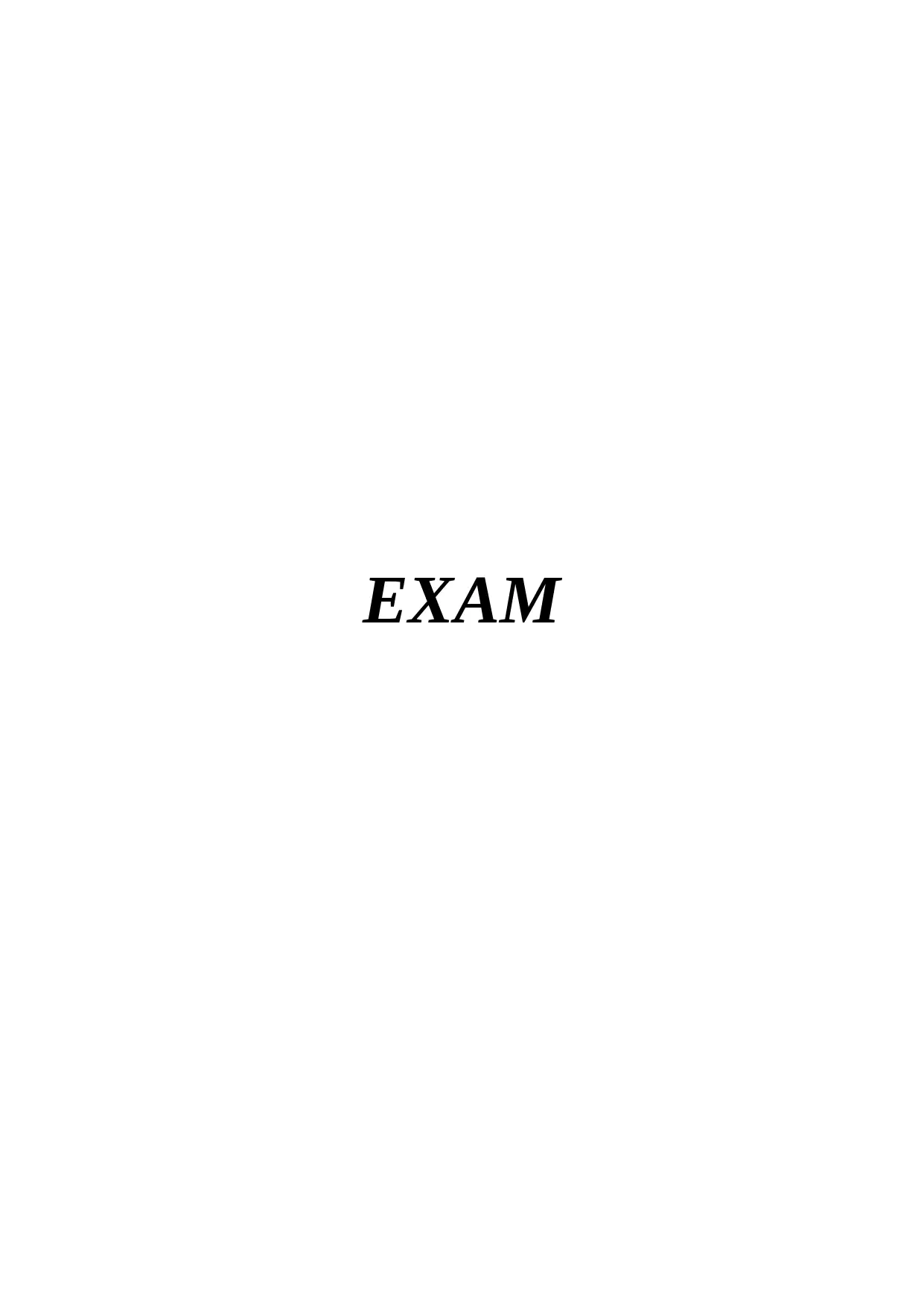
EXAM
Paraphrase This Document
Need a fresh take? Get an instant paraphrase of this document with our AI Paraphraser
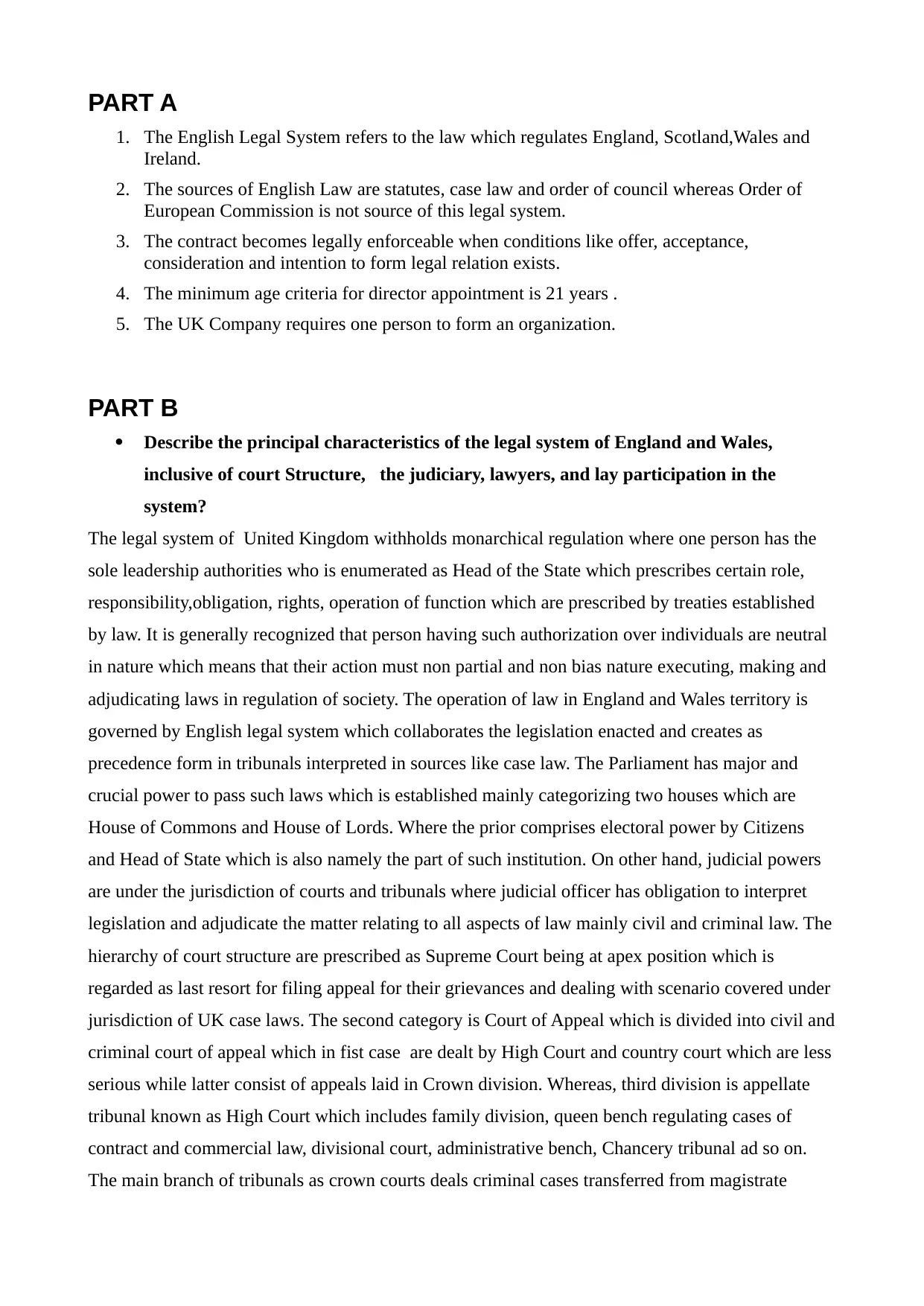
PART A
1. The English Legal System refers to the law which regulates England, Scotland,Wales and
Ireland.
2. The sources of English Law are statutes, case law and order of council whereas Order of
European Commission is not source of this legal system.
3. The contract becomes legally enforceable when conditions like offer, acceptance,
consideration and intention to form legal relation exists.
4. The minimum age criteria for director appointment is 21 years .
5. The UK Company requires one person to form an organization.
PART B
Describe the principal characteristics of the legal system of England and Wales,
inclusive of court Structure, the judiciary, lawyers, and lay participation in the
system?
The legal system of United Kingdom withholds monarchical regulation where one person has the
sole leadership authorities who is enumerated as Head of the State which prescribes certain role,
responsibility,obligation, rights, operation of function which are prescribed by treaties established
by law. It is generally recognized that person having such authorization over individuals are neutral
in nature which means that their action must non partial and non bias nature executing, making and
adjudicating laws in regulation of society. The operation of law in England and Wales territory is
governed by English legal system which collaborates the legislation enacted and creates as
precedence form in tribunals interpreted in sources like case law. The Parliament has major and
crucial power to pass such laws which is established mainly categorizing two houses which are
House of Commons and House of Lords. Where the prior comprises electoral power by Citizens
and Head of State which is also namely the part of such institution. On other hand, judicial powers
are under the jurisdiction of courts and tribunals where judicial officer has obligation to interpret
legislation and adjudicate the matter relating to all aspects of law mainly civil and criminal law. The
hierarchy of court structure are prescribed as Supreme Court being at apex position which is
regarded as last resort for filing appeal for their grievances and dealing with scenario covered under
jurisdiction of UK case laws. The second category is Court of Appeal which is divided into civil and
criminal court of appeal which in fist case are dealt by High Court and country court which are less
serious while latter consist of appeals laid in Crown division. Whereas, third division is appellate
tribunal known as High Court which includes family division, queen bench regulating cases of
contract and commercial law, divisional court, administrative bench, Chancery tribunal ad so on.
The main branch of tribunals as crown courts deals criminal cases transferred from magistrate
1. The English Legal System refers to the law which regulates England, Scotland,Wales and
Ireland.
2. The sources of English Law are statutes, case law and order of council whereas Order of
European Commission is not source of this legal system.
3. The contract becomes legally enforceable when conditions like offer, acceptance,
consideration and intention to form legal relation exists.
4. The minimum age criteria for director appointment is 21 years .
5. The UK Company requires one person to form an organization.
PART B
Describe the principal characteristics of the legal system of England and Wales,
inclusive of court Structure, the judiciary, lawyers, and lay participation in the
system?
The legal system of United Kingdom withholds monarchical regulation where one person has the
sole leadership authorities who is enumerated as Head of the State which prescribes certain role,
responsibility,obligation, rights, operation of function which are prescribed by treaties established
by law. It is generally recognized that person having such authorization over individuals are neutral
in nature which means that their action must non partial and non bias nature executing, making and
adjudicating laws in regulation of society. The operation of law in England and Wales territory is
governed by English legal system which collaborates the legislation enacted and creates as
precedence form in tribunals interpreted in sources like case law. The Parliament has major and
crucial power to pass such laws which is established mainly categorizing two houses which are
House of Commons and House of Lords. Where the prior comprises electoral power by Citizens
and Head of State which is also namely the part of such institution. On other hand, judicial powers
are under the jurisdiction of courts and tribunals where judicial officer has obligation to interpret
legislation and adjudicate the matter relating to all aspects of law mainly civil and criminal law. The
hierarchy of court structure are prescribed as Supreme Court being at apex position which is
regarded as last resort for filing appeal for their grievances and dealing with scenario covered under
jurisdiction of UK case laws. The second category is Court of Appeal which is divided into civil and
criminal court of appeal which in fist case are dealt by High Court and country court which are less
serious while latter consist of appeals laid in Crown division. Whereas, third division is appellate
tribunal known as High Court which includes family division, queen bench regulating cases of
contract and commercial law, divisional court, administrative bench, Chancery tribunal ad so on.
The main branch of tribunals as crown courts deals criminal cases transferred from magistrate
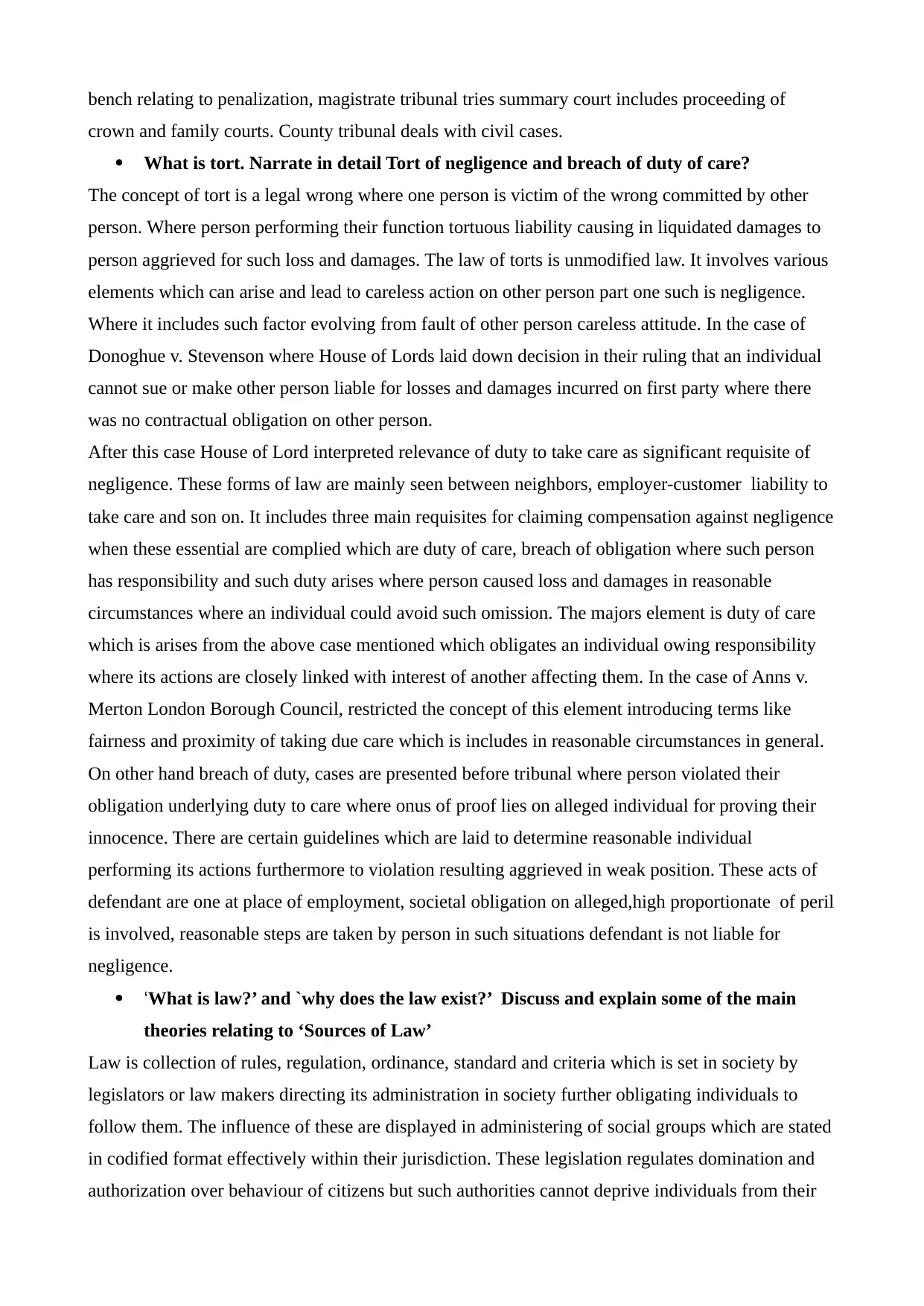
bench relating to penalization, magistrate tribunal tries summary court includes proceeding of
crown and family courts. County tribunal deals with civil cases.
What is tort. Narrate in detail Tort of negligence and breach of duty of care?
The concept of tort is a legal wrong where one person is victim of the wrong committed by other
person. Where person performing their function tortuous liability causing in liquidated damages to
person aggrieved for such loss and damages. The law of torts is unmodified law. It involves various
elements which can arise and lead to careless action on other person part one such is negligence.
Where it includes such factor evolving from fault of other person careless attitude. In the case of
Donoghue v. Stevenson where House of Lords laid down decision in their ruling that an individual
cannot sue or make other person liable for losses and damages incurred on first party where there
was no contractual obligation on other person.
After this case House of Lord interpreted relevance of duty to take care as significant requisite of
negligence. These forms of law are mainly seen between neighbors, employer-customer liability to
take care and son on. It includes three main requisites for claiming compensation against negligence
when these essential are complied which are duty of care, breach of obligation where such person
has responsibility and such duty arises where person caused loss and damages in reasonable
circumstances where an individual could avoid such omission. The majors element is duty of care
which is arises from the above case mentioned which obligates an individual owing responsibility
where its actions are closely linked with interest of another affecting them. In the case of Anns v.
Merton London Borough Council, restricted the concept of this element introducing terms like
fairness and proximity of taking due care which is includes in reasonable circumstances in general.
On other hand breach of duty, cases are presented before tribunal where person violated their
obligation underlying duty to care where onus of proof lies on alleged individual for proving their
innocence. There are certain guidelines which are laid to determine reasonable individual
performing its actions furthermore to violation resulting aggrieved in weak position. These acts of
defendant are one at place of employment, societal obligation on alleged,high proportionate of peril
is involved, reasonable steps are taken by person in such situations defendant is not liable for
negligence.
‘What is law?’ and `why does the law exist?’ Discuss and explain some of the main
theories relating to ‘Sources of Law’
Law is collection of rules, regulation, ordinance, standard and criteria which is set in society by
legislators or law makers directing its administration in society further obligating individuals to
follow them. The influence of these are displayed in administering of social groups which are stated
in codified format effectively within their jurisdiction. These legislation regulates domination and
authorization over behaviour of citizens but such authorities cannot deprive individuals from their
crown and family courts. County tribunal deals with civil cases.
What is tort. Narrate in detail Tort of negligence and breach of duty of care?
The concept of tort is a legal wrong where one person is victim of the wrong committed by other
person. Where person performing their function tortuous liability causing in liquidated damages to
person aggrieved for such loss and damages. The law of torts is unmodified law. It involves various
elements which can arise and lead to careless action on other person part one such is negligence.
Where it includes such factor evolving from fault of other person careless attitude. In the case of
Donoghue v. Stevenson where House of Lords laid down decision in their ruling that an individual
cannot sue or make other person liable for losses and damages incurred on first party where there
was no contractual obligation on other person.
After this case House of Lord interpreted relevance of duty to take care as significant requisite of
negligence. These forms of law are mainly seen between neighbors, employer-customer liability to
take care and son on. It includes three main requisites for claiming compensation against negligence
when these essential are complied which are duty of care, breach of obligation where such person
has responsibility and such duty arises where person caused loss and damages in reasonable
circumstances where an individual could avoid such omission. The majors element is duty of care
which is arises from the above case mentioned which obligates an individual owing responsibility
where its actions are closely linked with interest of another affecting them. In the case of Anns v.
Merton London Borough Council, restricted the concept of this element introducing terms like
fairness and proximity of taking due care which is includes in reasonable circumstances in general.
On other hand breach of duty, cases are presented before tribunal where person violated their
obligation underlying duty to care where onus of proof lies on alleged individual for proving their
innocence. There are certain guidelines which are laid to determine reasonable individual
performing its actions furthermore to violation resulting aggrieved in weak position. These acts of
defendant are one at place of employment, societal obligation on alleged,high proportionate of peril
is involved, reasonable steps are taken by person in such situations defendant is not liable for
negligence.
‘What is law?’ and `why does the law exist?’ Discuss and explain some of the main
theories relating to ‘Sources of Law’
Law is collection of rules, regulation, ordinance, standard and criteria which is set in society by
legislators or law makers directing its administration in society further obligating individuals to
follow them. The influence of these are displayed in administering of social groups which are stated
in codified format effectively within their jurisdiction. These legislation regulates domination and
authorization over behaviour of citizens but such authorities cannot deprive individuals from their
⊘ This is a preview!⊘
Do you want full access?
Subscribe today to unlock all pages.

Trusted by 1+ million students worldwide
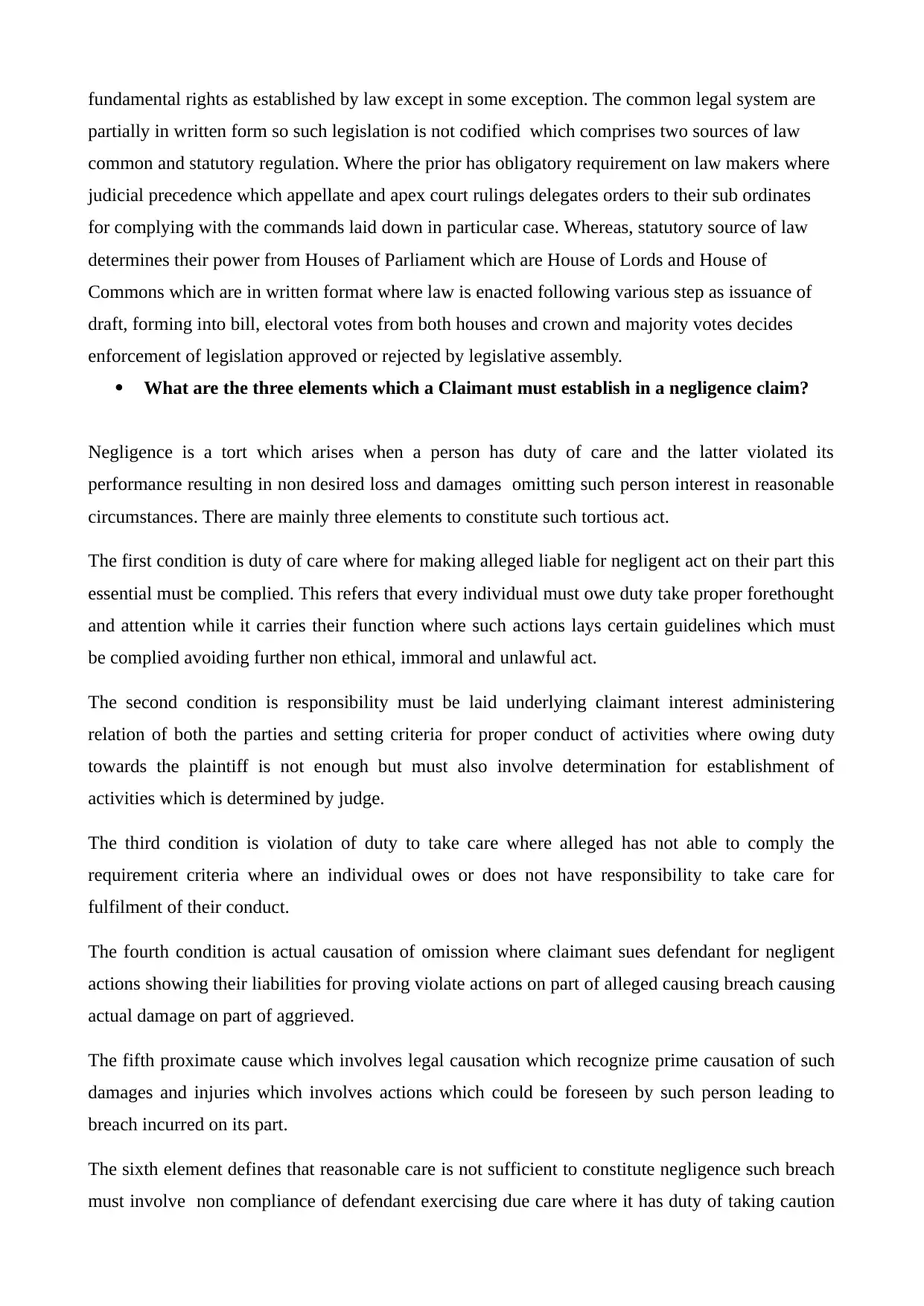
fundamental rights as established by law except in some exception. The common legal system are
partially in written form so such legislation is not codified which comprises two sources of law
common and statutory regulation. Where the prior has obligatory requirement on law makers where
judicial precedence which appellate and apex court rulings delegates orders to their sub ordinates
for complying with the commands laid down in particular case. Whereas, statutory source of law
determines their power from Houses of Parliament which are House of Lords and House of
Commons which are in written format where law is enacted following various step as issuance of
draft, forming into bill, electoral votes from both houses and crown and majority votes decides
enforcement of legislation approved or rejected by legislative assembly.
What are the three elements which a Claimant must establish in a negligence claim?
Negligence is a tort which arises when a person has duty of care and the latter violated its
performance resulting in non desired loss and damages omitting such person interest in reasonable
circumstances. There are mainly three elements to constitute such tortious act.
The first condition is duty of care where for making alleged liable for negligent act on their part this
essential must be complied. This refers that every individual must owe duty take proper forethought
and attention while it carries their function where such actions lays certain guidelines which must
be complied avoiding further non ethical, immoral and unlawful act.
The second condition is responsibility must be laid underlying claimant interest administering
relation of both the parties and setting criteria for proper conduct of activities where owing duty
towards the plaintiff is not enough but must also involve determination for establishment of
activities which is determined by judge.
The third condition is violation of duty to take care where alleged has not able to comply the
requirement criteria where an individual owes or does not have responsibility to take care for
fulfilment of their conduct.
The fourth condition is actual causation of omission where claimant sues defendant for negligent
actions showing their liabilities for proving violate actions on part of alleged causing breach causing
actual damage on part of aggrieved.
The fifth proximate cause which involves legal causation which recognize prime causation of such
damages and injuries which involves actions which could be foreseen by such person leading to
breach incurred on its part.
The sixth element defines that reasonable care is not sufficient to constitute negligence such breach
must involve non compliance of defendant exercising due care where it has duty of taking caution
partially in written form so such legislation is not codified which comprises two sources of law
common and statutory regulation. Where the prior has obligatory requirement on law makers where
judicial precedence which appellate and apex court rulings delegates orders to their sub ordinates
for complying with the commands laid down in particular case. Whereas, statutory source of law
determines their power from Houses of Parliament which are House of Lords and House of
Commons which are in written format where law is enacted following various step as issuance of
draft, forming into bill, electoral votes from both houses and crown and majority votes decides
enforcement of legislation approved or rejected by legislative assembly.
What are the three elements which a Claimant must establish in a negligence claim?
Negligence is a tort which arises when a person has duty of care and the latter violated its
performance resulting in non desired loss and damages omitting such person interest in reasonable
circumstances. There are mainly three elements to constitute such tortious act.
The first condition is duty of care where for making alleged liable for negligent act on their part this
essential must be complied. This refers that every individual must owe duty take proper forethought
and attention while it carries their function where such actions lays certain guidelines which must
be complied avoiding further non ethical, immoral and unlawful act.
The second condition is responsibility must be laid underlying claimant interest administering
relation of both the parties and setting criteria for proper conduct of activities where owing duty
towards the plaintiff is not enough but must also involve determination for establishment of
activities which is determined by judge.
The third condition is violation of duty to take care where alleged has not able to comply the
requirement criteria where an individual owes or does not have responsibility to take care for
fulfilment of their conduct.
The fourth condition is actual causation of omission where claimant sues defendant for negligent
actions showing their liabilities for proving violate actions on part of alleged causing breach causing
actual damage on part of aggrieved.
The fifth proximate cause which involves legal causation which recognize prime causation of such
damages and injuries which involves actions which could be foreseen by such person leading to
breach incurred on its part.
The sixth element defines that reasonable care is not sufficient to constitute negligence such breach
must involve non compliance of defendant exercising due care where it has duty of taking caution
Paraphrase This Document
Need a fresh take? Get an instant paraphrase of this document with our AI Paraphraser
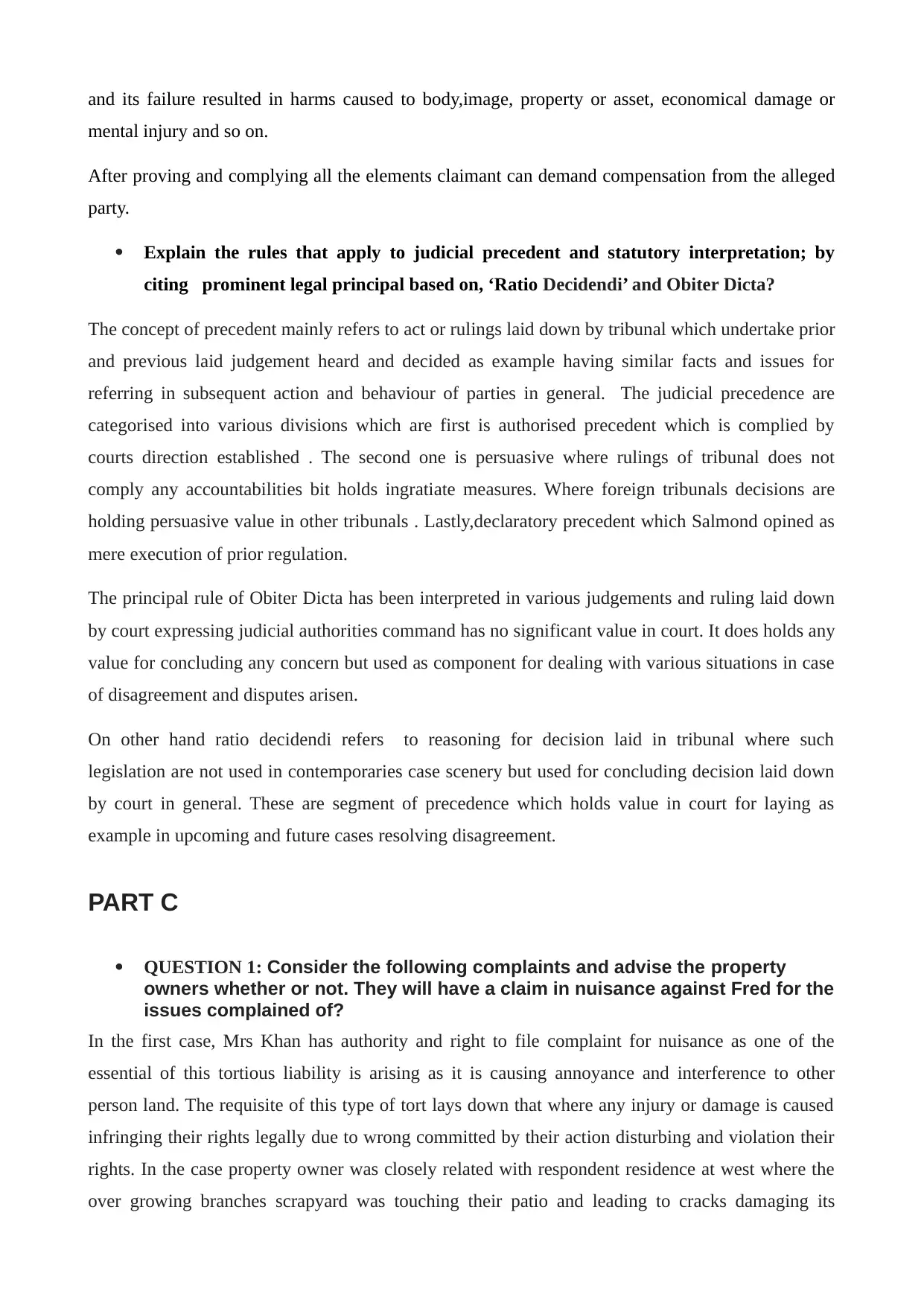
and its failure resulted in harms caused to body,image, property or asset, economical damage or
mental injury and so on.
After proving and complying all the elements claimant can demand compensation from the alleged
party.
Explain the rules that apply to judicial precedent and statutory interpretation; by
citing prominent legal principal based on, ‘Ratio Decidendi’ and Obiter Dicta?
The concept of precedent mainly refers to act or rulings laid down by tribunal which undertake prior
and previous laid judgement heard and decided as example having similar facts and issues for
referring in subsequent action and behaviour of parties in general. The judicial precedence are
categorised into various divisions which are first is authorised precedent which is complied by
courts direction established . The second one is persuasive where rulings of tribunal does not
comply any accountabilities bit holds ingratiate measures. Where foreign tribunals decisions are
holding persuasive value in other tribunals . Lastly,declaratory precedent which Salmond opined as
mere execution of prior regulation.
The principal rule of Obiter Dicta has been interpreted in various judgements and ruling laid down
by court expressing judicial authorities command has no significant value in court. It does holds any
value for concluding any concern but used as component for dealing with various situations in case
of disagreement and disputes arisen.
On other hand ratio decidendi refers to reasoning for decision laid in tribunal where such
legislation are not used in contemporaries case scenery but used for concluding decision laid down
by court in general. These are segment of precedence which holds value in court for laying as
example in upcoming and future cases resolving disagreement.
PART C
QUESTION 1: Consider the following complaints and advise the property
owners whether or not. They will have a claim in nuisance against Fred for the
issues complained of?
In the first case, Mrs Khan has authority and right to file complaint for nuisance as one of the
essential of this tortious liability is arising as it is causing annoyance and interference to other
person land. The requisite of this type of tort lays down that where any injury or damage is caused
infringing their rights legally due to wrong committed by their action disturbing and violation their
rights. In the case property owner was closely related with respondent residence at west where the
over growing branches scrapyard was touching their patio and leading to cracks damaging its
mental injury and so on.
After proving and complying all the elements claimant can demand compensation from the alleged
party.
Explain the rules that apply to judicial precedent and statutory interpretation; by
citing prominent legal principal based on, ‘Ratio Decidendi’ and Obiter Dicta?
The concept of precedent mainly refers to act or rulings laid down by tribunal which undertake prior
and previous laid judgement heard and decided as example having similar facts and issues for
referring in subsequent action and behaviour of parties in general. The judicial precedence are
categorised into various divisions which are first is authorised precedent which is complied by
courts direction established . The second one is persuasive where rulings of tribunal does not
comply any accountabilities bit holds ingratiate measures. Where foreign tribunals decisions are
holding persuasive value in other tribunals . Lastly,declaratory precedent which Salmond opined as
mere execution of prior regulation.
The principal rule of Obiter Dicta has been interpreted in various judgements and ruling laid down
by court expressing judicial authorities command has no significant value in court. It does holds any
value for concluding any concern but used as component for dealing with various situations in case
of disagreement and disputes arisen.
On other hand ratio decidendi refers to reasoning for decision laid in tribunal where such
legislation are not used in contemporaries case scenery but used for concluding decision laid down
by court in general. These are segment of precedence which holds value in court for laying as
example in upcoming and future cases resolving disagreement.
PART C
QUESTION 1: Consider the following complaints and advise the property
owners whether or not. They will have a claim in nuisance against Fred for the
issues complained of?
In the first case, Mrs Khan has authority and right to file complaint for nuisance as one of the
essential of this tortious liability is arising as it is causing annoyance and interference to other
person land. The requisite of this type of tort lays down that where any injury or damage is caused
infringing their rights legally due to wrong committed by their action disturbing and violation their
rights. In the case property owner was closely related with respondent residence at west where the
over growing branches scrapyard was touching their patio and leading to cracks damaging its
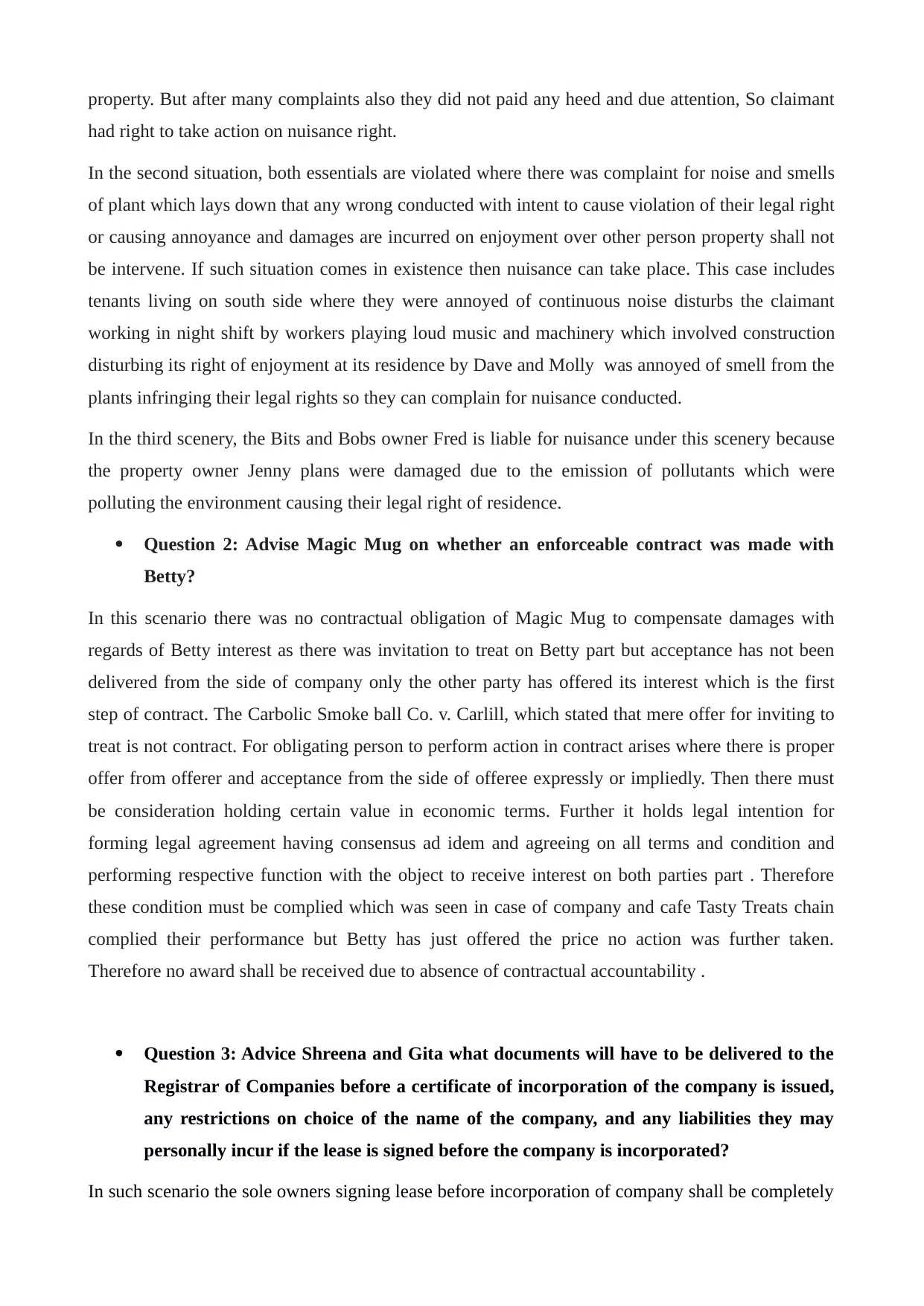
property. But after many complaints also they did not paid any heed and due attention, So claimant
had right to take action on nuisance right.
In the second situation, both essentials are violated where there was complaint for noise and smells
of plant which lays down that any wrong conducted with intent to cause violation of their legal right
or causing annoyance and damages are incurred on enjoyment over other person property shall not
be intervene. If such situation comes in existence then nuisance can take place. This case includes
tenants living on south side where they were annoyed of continuous noise disturbs the claimant
working in night shift by workers playing loud music and machinery which involved construction
disturbing its right of enjoyment at its residence by Dave and Molly was annoyed of smell from the
plants infringing their legal rights so they can complain for nuisance conducted.
In the third scenery, the Bits and Bobs owner Fred is liable for nuisance under this scenery because
the property owner Jenny plans were damaged due to the emission of pollutants which were
polluting the environment causing their legal right of residence.
Question 2: Advise Magic Mug on whether an enforceable contract was made with
Betty?
In this scenario there was no contractual obligation of Magic Mug to compensate damages with
regards of Betty interest as there was invitation to treat on Betty part but acceptance has not been
delivered from the side of company only the other party has offered its interest which is the first
step of contract. The Carbolic Smoke ball Co. v. Carlill, which stated that mere offer for inviting to
treat is not contract. For obligating person to perform action in contract arises where there is proper
offer from offerer and acceptance from the side of offeree expressly or impliedly. Then there must
be consideration holding certain value in economic terms. Further it holds legal intention for
forming legal agreement having consensus ad idem and agreeing on all terms and condition and
performing respective function with the object to receive interest on both parties part . Therefore
these condition must be complied which was seen in case of company and cafe Tasty Treats chain
complied their performance but Betty has just offered the price no action was further taken.
Therefore no award shall be received due to absence of contractual accountability .
Question 3: Advice Shreena and Gita what documents will have to be delivered to the
Registrar of Companies before a certificate of incorporation of the company is issued,
any restrictions on choice of the name of the company, and any liabilities they may
personally incur if the lease is signed before the company is incorporated?
In such scenario the sole owners signing lease before incorporation of company shall be completely
had right to take action on nuisance right.
In the second situation, both essentials are violated where there was complaint for noise and smells
of plant which lays down that any wrong conducted with intent to cause violation of their legal right
or causing annoyance and damages are incurred on enjoyment over other person property shall not
be intervene. If such situation comes in existence then nuisance can take place. This case includes
tenants living on south side where they were annoyed of continuous noise disturbs the claimant
working in night shift by workers playing loud music and machinery which involved construction
disturbing its right of enjoyment at its residence by Dave and Molly was annoyed of smell from the
plants infringing their legal rights so they can complain for nuisance conducted.
In the third scenery, the Bits and Bobs owner Fred is liable for nuisance under this scenery because
the property owner Jenny plans were damaged due to the emission of pollutants which were
polluting the environment causing their legal right of residence.
Question 2: Advise Magic Mug on whether an enforceable contract was made with
Betty?
In this scenario there was no contractual obligation of Magic Mug to compensate damages with
regards of Betty interest as there was invitation to treat on Betty part but acceptance has not been
delivered from the side of company only the other party has offered its interest which is the first
step of contract. The Carbolic Smoke ball Co. v. Carlill, which stated that mere offer for inviting to
treat is not contract. For obligating person to perform action in contract arises where there is proper
offer from offerer and acceptance from the side of offeree expressly or impliedly. Then there must
be consideration holding certain value in economic terms. Further it holds legal intention for
forming legal agreement having consensus ad idem and agreeing on all terms and condition and
performing respective function with the object to receive interest on both parties part . Therefore
these condition must be complied which was seen in case of company and cafe Tasty Treats chain
complied their performance but Betty has just offered the price no action was further taken.
Therefore no award shall be received due to absence of contractual accountability .
Question 3: Advice Shreena and Gita what documents will have to be delivered to the
Registrar of Companies before a certificate of incorporation of the company is issued,
any restrictions on choice of the name of the company, and any liabilities they may
personally incur if the lease is signed before the company is incorporated?
In such scenario the sole owners signing lease before incorporation of company shall be completely
⊘ This is a preview!⊘
Do you want full access?
Subscribe today to unlock all pages.

Trusted by 1+ million students worldwide
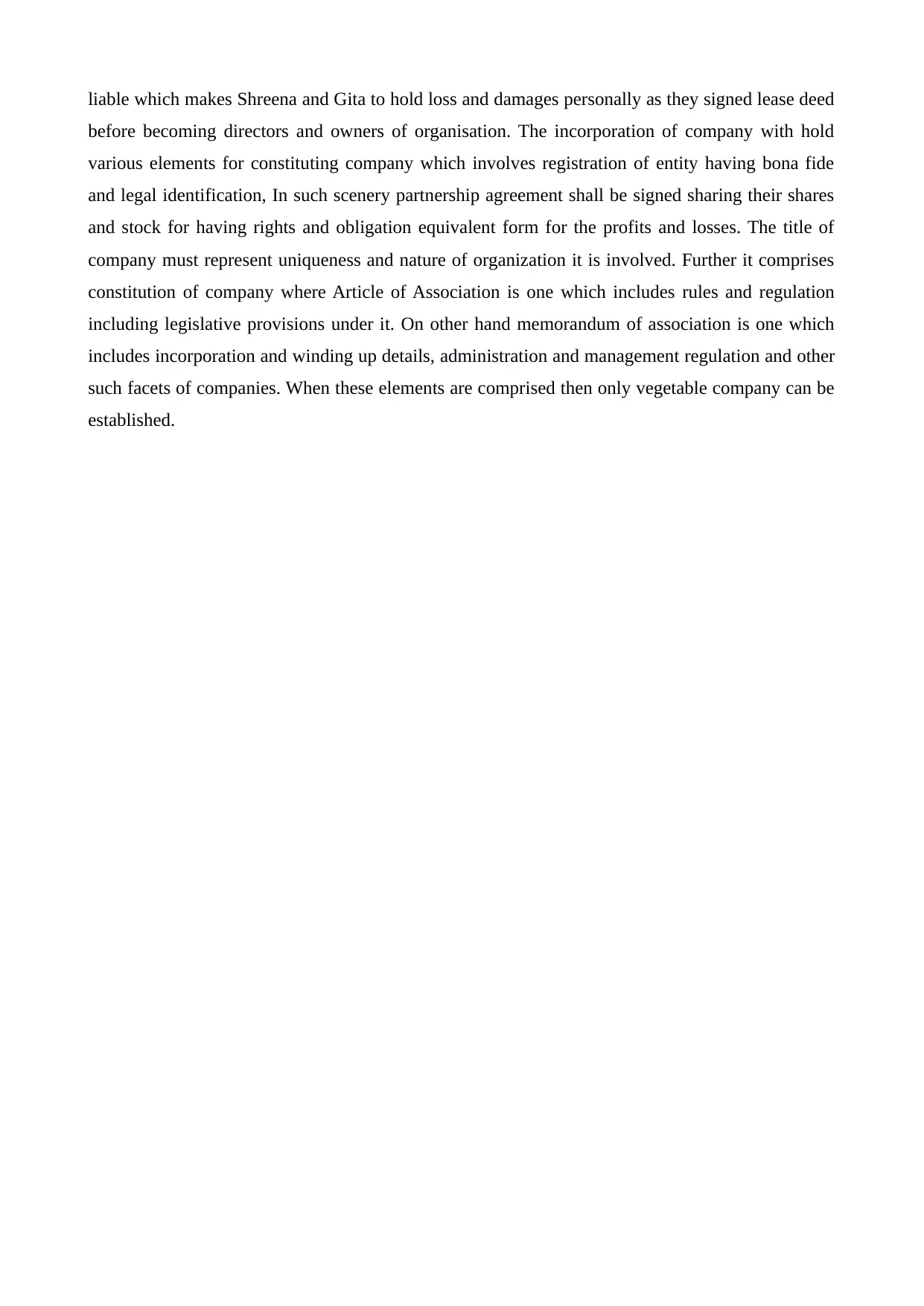
liable which makes Shreena and Gita to hold loss and damages personally as they signed lease deed
before becoming directors and owners of organisation. The incorporation of company with hold
various elements for constituting company which involves registration of entity having bona fide
and legal identification, In such scenery partnership agreement shall be signed sharing their shares
and stock for having rights and obligation equivalent form for the profits and losses. The title of
company must represent uniqueness and nature of organization it is involved. Further it comprises
constitution of company where Article of Association is one which includes rules and regulation
including legislative provisions under it. On other hand memorandum of association is one which
includes incorporation and winding up details, administration and management regulation and other
such facets of companies. When these elements are comprised then only vegetable company can be
established.
before becoming directors and owners of organisation. The incorporation of company with hold
various elements for constituting company which involves registration of entity having bona fide
and legal identification, In such scenery partnership agreement shall be signed sharing their shares
and stock for having rights and obligation equivalent form for the profits and losses. The title of
company must represent uniqueness and nature of organization it is involved. Further it comprises
constitution of company where Article of Association is one which includes rules and regulation
including legislative provisions under it. On other hand memorandum of association is one which
includes incorporation and winding up details, administration and management regulation and other
such facets of companies. When these elements are comprised then only vegetable company can be
established.
1 out of 7
Related Documents
Your All-in-One AI-Powered Toolkit for Academic Success.
+13062052269
info@desklib.com
Available 24*7 on WhatsApp / Email
![[object Object]](/_next/static/media/star-bottom.7253800d.svg)
Unlock your academic potential
Copyright © 2020–2026 A2Z Services. All Rights Reserved. Developed and managed by ZUCOL.



